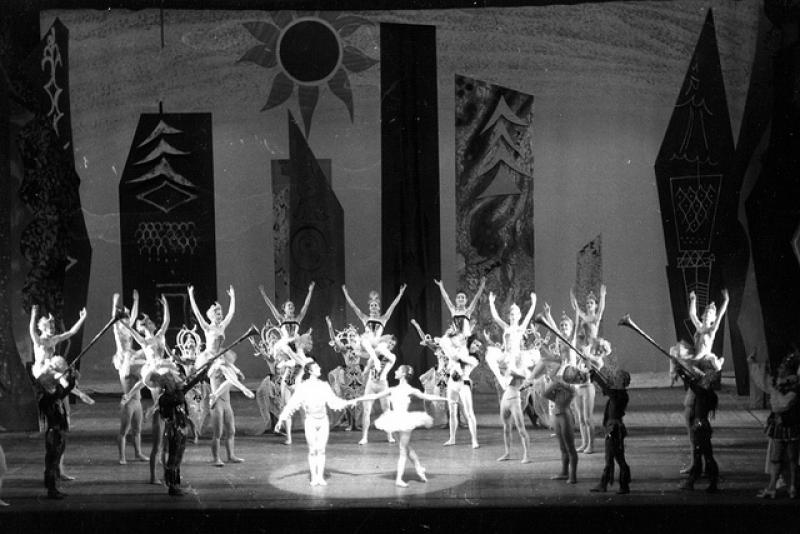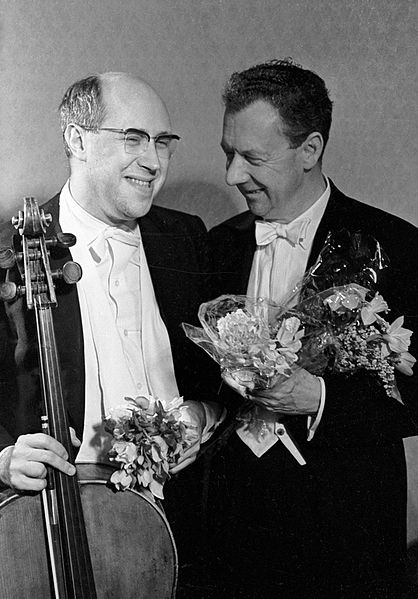Mørk, Padmore, LPO, Jurowski, Royal Festival Hall | reviews, news & interviews
Mørk, Padmore, LPO, Jurowski, Royal Festival Hall
Mørk, Padmore, LPO, Jurowski, Royal Festival Hall
Brilliantly programmed quartet of contrasting Britten works spotlights instrumental genius

Interviewed live just before his Proms performance of Britten’s Serenade, Ben Johnson was asked the usual question as to whether the composer wrote especially well for the tenor voice. “He writes amazingly for every instrument,” came the reply. If we needed a single-programme testament to that special genius, this all-Britten celebration from Vladimir Jurowski and his London Philharmonic Orchestra was it.
In the music selected here, it mostly was, since the numbers we heard from The Prince of the Pagodas steered clear of whole stretches in the full-length ballet score where Britten’s imagination seems to have deserted him. It was, as usual with this conductor, a generous and unorthodox programme, a daring quartet of works from the last two decades of a fertile composing life. None of them would probably be in the standard list of top ten best-loved Britten (though two, the Nocturne and the Cello Symphony, are close to the top of mine).
There are supernatural humour and lightness in the sleepscape of Nocturne Jurowski applied his whiplash, quick-change effect to the ballet suite – his own selection, I’m guessing, lacking only the gamelan effects of Pagoda Land and minimizing the pall of all those scales and arpeggios in the apotheosis. The court gavotte, deliciously transformed Tchaikovsky-style from the adjoining march, bounced so swiftly that you wondered if the players could manage the rapid speed-up at the end (they did). Strings cascaded with precise brilliance, dazzling in the Stravinsky-Apollo style characterization of haughty villainness Belle Épine and with violins in the spotlight for “Hunt the Squirrel” from Britten’s last orchestral work, the Suite on English Folk Songs of 1974.
Here the fun withered at the end of the first half. Sue Böhling stood apart for the poignant cor anglais solo in the suite's concluding number, “Lord Melbourne”, steering clear of English pastoral music’s cowpats with its freedom, its disturbing build and the sudden shock of a doubling with muted trumpet (who else but Britten would have thought of that combination?) It linked well with the even more desolate solo in the sixth (Wilfred Owen) setting of the composer’s most masterly poetry-anthology, the Nocturne: coming as it does after the timpani-ridden setting of Wordsworth’s night fears from The Prelude, it shows that in 1958 Britten knew the Shostakovich of the terror-stricken Eighth Symphony.
 But there are supernatural humour and lightness in the sleepscape here too, with horn doing the eerie night animal noises of Middleton’s “Midnight Bell”, flute and clarinet skipping and burbling round Keats’s image-rich ode to sleep. Invidious to single out any one of the seven obbligato soloists:all were superlatively subtle and so, I guess, was tenor Mark Padmore, though from my seat at the right side of the stalls he was masked by Jurowski and the words couldn’t often be heard (quite the opposite effect of his Billy Budd Captain Vere at the Proms).
But there are supernatural humour and lightness in the sleepscape here too, with horn doing the eerie night animal noises of Middleton’s “Midnight Bell”, flute and clarinet skipping and burbling round Keats’s image-rich ode to sleep. Invidious to single out any one of the seven obbligato soloists:all were superlatively subtle and so, I guess, was tenor Mark Padmore, though from my seat at the right side of the stalls he was masked by Jurowski and the words couldn’t often be heard (quite the opposite effect of his Billy Budd Captain Vere at the Proms).
Rather quiet, too, from that perspective - and given such personal circumstances I won't withhold the fifth star - was cellist Truls Mørk, falling short at first of the declamatory urgency of Mstislav Rostropovich for whom Britten (pictured above with the cellist after a Moscow performance) wrote the magnificently austere Cello Symphony. But in troubled self-communings and fine tuning to the orchestral colleagues who share equal honours, as the title of the work suggests, Mørk was matchless. It was the crowning glory of Jurowski’s programme to place this masterpiece last, not in the usual concerto slot; its long-term symphonic journey from growling low timbres and fragmentary despair to utterly convincing optimism, the “far-shining sail" on the "infinite sea" glimpsed by Vere at the end of Billy Budd, meant that nothing else could follow.
rating
Share this article
more Classical music
 Watts, BBC Symphony Orchestra and Chorus, Bignamini, Barbican review - blazing French masterpieces
Poulenc’s Gloria and Berlioz’s 'Symphonie fantastique' on fire
Watts, BBC Symphony Orchestra and Chorus, Bignamini, Barbican review - blazing French masterpieces
Poulenc’s Gloria and Berlioz’s 'Symphonie fantastique' on fire
 Bell, Perahia, ASMF Chamber Ensemble, Wigmore Hall review - joy in teamwork
A great pianist re-emerges in Schumann, but Beamish and Mendelssohn take the palm
Bell, Perahia, ASMF Chamber Ensemble, Wigmore Hall review - joy in teamwork
A great pianist re-emerges in Schumann, but Beamish and Mendelssohn take the palm
 First Persons: composers Colin Alexander and Héloïse Werner on fantasy in guided improvisation
On five new works allowing an element of freedom in the performance
First Persons: composers Colin Alexander and Héloïse Werner on fantasy in guided improvisation
On five new works allowing an element of freedom in the performance
 First Person: Leeds Lieder Festival director and pianist Joseph Middleton on a beloved organisation back from the brink
Arts Council funding restored after the blow of 2023, new paths are being forged
First Person: Leeds Lieder Festival director and pianist Joseph Middleton on a beloved organisation back from the brink
Arts Council funding restored after the blow of 2023, new paths are being forged
 Classical CDs: Nymphs, magots and buckgoats
Epic symphonies, popular music from 17th century London and an engrossing tribute to a great Spanish pianist
Classical CDs: Nymphs, magots and buckgoats
Epic symphonies, popular music from 17th century London and an engrossing tribute to a great Spanish pianist
 Sheku Kanneh-Mason, Philharmonia Chorus, RPO, Petrenko, RFH review - poetic cello, blazing chorus
Atmospheric Elgar and Weinberg, but Rachmaninov's 'The Bells' takes the palm
Sheku Kanneh-Mason, Philharmonia Chorus, RPO, Petrenko, RFH review - poetic cello, blazing chorus
Atmospheric Elgar and Weinberg, but Rachmaninov's 'The Bells' takes the palm
 Daphnis et Chloé, Tenebrae, LSO, Pappano, Barbican review - lighting up Ravel’s ‘choreographic symphony’
All details outstanding in the lavish canvas of a giant masterpiece
Daphnis et Chloé, Tenebrae, LSO, Pappano, Barbican review - lighting up Ravel’s ‘choreographic symphony’
All details outstanding in the lavish canvas of a giant masterpiece
 Goldscheider, Spence, Britten Sinfonia, Milton Court review - heroic evening songs and a jolly horn ramble
Direct, cheerful new concerto by Huw Watkins, but the programme didn’t quite cohere
Goldscheider, Spence, Britten Sinfonia, Milton Court review - heroic evening songs and a jolly horn ramble
Direct, cheerful new concerto by Huw Watkins, but the programme didn’t quite cohere
 Marwood, Power, Watkins, Hallé, Adès, Bridgewater Hall, Manchester review - sonic adventure and luxuriance
Premiere of a mesmeric piece from composer Oliver Leith
Marwood, Power, Watkins, Hallé, Adès, Bridgewater Hall, Manchester review - sonic adventure and luxuriance
Premiere of a mesmeric piece from composer Oliver Leith
 Elmore String Quartet, Kings Place review - impressive playing from an emerging group
A new work holds its own alongside acknowledged masterpieces
Elmore String Quartet, Kings Place review - impressive playing from an emerging group
A new work holds its own alongside acknowledged masterpieces
 Gilliver, LSO, Roth, Barbican review - the future is bright
Vivid engagement in fresh works by young British composers, and an orchestra on form
Gilliver, LSO, Roth, Barbican review - the future is bright
Vivid engagement in fresh works by young British composers, and an orchestra on form
 Josefowicz, LPO, Järvi, RFH review - friendly monsters
Mighty but accessible Bruckner from a peerless interpreter
Josefowicz, LPO, Järvi, RFH review - friendly monsters
Mighty but accessible Bruckner from a peerless interpreter

Add comment